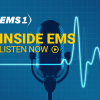Download this quick clip on iTunes, SoundCloud or via RSS feed
In this week’s Inside EMS podcast, hosts Chris Cebollero and Kelly Grayson discuss the latest concerns about Ebola, and the hysteria it’s causing across the United States and the world.
Cebollero said when two infected aid workers first came to the United States for treatment in August, the spread of the virus wasn’t taken as seriously as it could have been by his department.
Now, they’re working on a full Ebola plan, simulating two different scenarios of someone with the virus walking into the ER, and if EMS gets a call involving a potentially infected patient.
Grayson also brought up the Centers for Disease Control guidelines for detecting and managing EMS agencies.
“It’s pretty much straightforward, standard precautions and good decontamination like we should normally do after every single call,” he said. “We just need to be more observant and stringent of it, and recognize the signs of Ebola.”
They also discussed a recent story about an Indiana medic charged with sexual assault of a disabled woman in the back of an ambulance. He said it goes against the trust of the community to constantly hear about medics stealing drugs from patients’ homes, stealing money, and sexually assaulting them.
Grayson said it may not be happening quite as often as people think, since the uneventful transports aren’t newsworthy.
“You think this thing is more prevalent than it is,” Grayson said, “because these are the kind of things that get reported.”
But it also comes down to policing our own, he said, and if this medic is found guilty he deserves to go to jail.
Along those same lines, in the Clinical Issue they talk about a Utah medic who police say was suspected in connection to a rash of thefts, and was allowed to resign without their knowledge before an investigation could be conducted.
In cases where narcotics are tampered with, our hosts remind us that medical directors put their DEA license on the line, and misconduct puts them at risk.
“I don’t know that we really take this charge with as much responsibility as we need to,” Cebollero said.
Grayson agreed.
“I think it was unconscionable that this guy was allowed to resign without further investigating,” he said. He added that there’s also something to be said for self-reporting. If a medic has a substance abuse problem, an EMS agency should have a program in place to help them.
Guest Mike Taigman, general manager at American Medical Response Ventura County/Gold Coast Ambulance, also talked about the educational standards EMS providers need to be successful in the future.
Taigman said EMS does a lot that, when you stand back and look at it, is more for the provider and the system than the patient. Instead, there needs to be a focus on what people need from EMS. Two easy places to start are to reduce suffering if a patient is suffering, and to reduce the risk of dying if a patient is at in the near future.
“If we begin with those two perspectives, looking at it from the patient’s viewpoint, I think we’ll make a whole lot better decisions,” Taigman said.
That’s not a new concept, Cebollero said, and he questioned why EMS doesn’t always do that.
Taigman also said that a community paramedicine approach around public health and social work are important for EMS to be prepared for the future. Teaching people how to use the medications they’re prescribed and looking at peoples’ lifestyles can make a huge difference, he said.
Here are links to some of the articles and other items mentioned on the show:
- CDC releases EMS checklist for detecting, managing Ebola
- Ebola: What does EMS need to know?
- Ind. medic charged with sexual assault of disabled woman
- Medic suspected in drug thefts resigns before investigation












